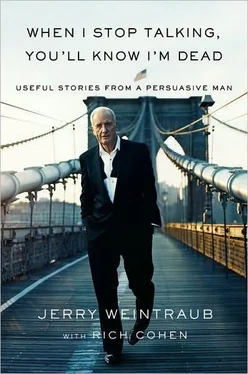I first heard about John when he left the Trio and was looking to make it on his own. He had been represented by Irwin Winkler, who was going into the movie business, and needed representation. A friend tipped me: "Jerry, check out this kid. He's playing a dive in Greenwich Village." So I went over. No one there. The joint was empty. Just this earnest kid with a pageboy haircut, singing and playing guitar on stage. I sat and listened. He made a connection immediately. That's how it was with him-his talent. With each song, you felt he had opened his chest and was showing you his beating heart.
Okay, you might think, Jerry Weintraub and John Denver, something does not compute, something is not right. How does a folk singer from New Mexico end up in league with a street kid from the Bronx? But the fact is, we were a lot alike, me and John, had a lot in common, which is why our friendship was so immediate and deep. He, too, had run away from home when he was a kid-he left in his father's car and turned up weeks later at a cousin's house in Los Angeles. He, too, wanted to get out into the world, see and experience everything, find his way. I saw all of this that first night in New York. I saw the talent, too. It was one of those rare moments you dream of as a manager-spotting the kid who will become a star, who is a star already, even if the world does not yet know it.
From that moment, I was determined to break John Denver. He would be a test case for all my theories on selling and packaging, for everything I had learned since I left home and before, on the streets in the Bronx and from my father. John Denver would be my Star of Ardaban.
I wanted to start by getting some noise going. Here was this gem, John Denver, playing five nights a week in Greenwich Village, virtually for free-he was making seventy dollars a show when I met him-and no one even knew it. I went all around New York and LA, talking my head off to all the big operators. John Denver. Have you seen this kid? John Denver. He's amazing. John Denver. I went on like this until my friends said, "All right. We get it! John Denver. Shut up."
"Shut up about who?"
"John Denver."
"Yeah, isn't he great?"
Then I started to embroider, embellish. I would say, "Wow, John Denver, this client of mine, he's so great, so on fire, that Bob Dylan has been hanging out in this club every night, watching him play."
Just get them there, that's what I believed. Just get them there, let them see this kid, they will love him.
Did it work?
Of course it did.
Within a few weeks, the place in the Village was packed, every seat filled, and the patrons three deep at the bar.
"Okay," I said, "now let us see what we can do about this seventy dollars a night nonsense."
John had cut a record for RCA. This was part of his long-term contract. He had already made Rhymes and Reasons and Take Me to Tomorrow. This was all before I got there-pre-Jerry. The new record was called Poems, Prayers and Promises. It had one obvious hit: "Take Me Home, Country Roads." But the challenge was the same as always: get people to hear it, to recognize it as a hit. This mirrors the greater challenge of the talent manager. I did not invent John Denver. I did not write his hits, or create anything that was not there before I arrived. No manager does that. As I tell aspiring agents and managers, remember where the engine lies: with the artist. If the artist makes nothing, I have nothing to sell. It's as simple as that.
It's best, when selling something new, to envision the goal-let the entire world hear John Denver-then work your way back. How do we get there? Now and then, it happens by itself. This is a matter of luck, zeitgeist. More often, you have to be creative, crabwalk your way. Once the new record was released, I sent John on a tour of the biggest radio stations in the country. He would turn up by himself, with his song and his guitar, as if he just stumbled out of the mountains.
You have to remember what John looked like back then. He was simple and blond with the bangs and the glasses. This was the early seventies, when everyone was looking for his own Jimmy Carter, a man he could trust. John, with his apple-pie face, was perfectly cast. He came to hate this, but he was lucky. He had just what the market was demanding. It was his trademark, as the blue suede shoes and pompadour trademarked Elvis. It was his thing. You can evolve and grow but you should never resent your thing. If you look at how few artists actually make it, you will recognize that those trademarks, though in some ways limiting, are a gift of providence. John would show up with his pageboy and all-American smile and say, "Hi, I'm John Denver. I would like to play a song for you." And bang, he was on the air.
At times, I used my other clients to break John. Fame is a private party. You can dazzle your way in with talent, or you can be vouched for. How far this can be carried depends entirely on who is doing the vouching. If it's Frankie Valli, okay, maybe. But if it's Sinatra? I arranged for John to cross paths with Elvis on the road. They went to radio stations, or Elvis mentioned one of John's songs. I had learned something important from the incident of the unsold scarves. A mention by Elvis was the same as a multimillion-dollar ad campaign.
I had Sinatra talk about John, hook up with John, be seen with John. You might think of Sinatra and Denver as a mismatch (like Weintraub and Denver; like martinis and moon-shine) but everything blurred in the seventies-this is when Sinatra recorded "(It's Not Easy) Bein' Green." It was an odd moment, and yet another lesson for producers and managers: know your age, sing its songs. If you cross-breed the Elvis audience with the Sinatra audience, you get the great big everyone the Colonel spent his life chasing. We were not interested in niche marketing, or in targeting a selected demographic: We wanted them all.
Soon after its release, "Country Roads" was dominating the charts. You could not turn on your radio without hearing it.
The song, the tour, the public appearances-these were means to an end, which was not merely to have a hit, but to turn John into a star: not a star in prospect, but a star now and yesterday, someone who has already happened, so accomplished it's no longer up for debate. It's why I did not present John Denver as an exciting find, or as someone who had recently been playing to an empty house in Greenwich Village, but as talent that had already made it, an accomplished fact. I sold him in the past tense, as someone you've known about for years. I was telling the audience to relax and enjoy, as the judgment has already been made. You love him! In this way, we skipped several steps, jumping directly from the early days of struggle to the golden years.
I bought every billboard on Sunset Boulevard from Bel Air to Hollywood. On each, I put a different picture of John, a different posture, a different mood. You could not drive to work without being bombarded. He was all over the place. By the time you heard his song, you already knew him. I met with executives at RCA. They wanted to cut a follow-up to Poems, Prayers and Promises. I convinced them to do a greatest-hits album, which was amazing, considering John only had one hit. This is what I mean by selling John as if he were already a star. They paid us a million dollars for the record-a huge sum in those days. It came out in 1977, went straight to the top of the charts, and stayed there.
We branched out from there, transitioning John to TV. Within a few years, he was almost as well known for his work on the small screen as he was for his songs. He made his first appearance on The Tonight Show in 1972. I was friends with Johnny Carson and hooked them up at a party at my house in Beverly Hills. John became a regular on The Tonight Show, appearing again and again. America was still one market, and Carson stood at the center of it-it's hard to explain just what a big deal that show was. Then, one summer, when Carson went on vacation, the producer asked John to fill in as guest host. It was a milestone for any entertainer-like the moment the mob takes you into a basement with the wood paneling and makes you swear loyalty over a book. You're a made man after that, untouchable.
Читать дальше

![Сьюзан Кейн - Quiet [The Power of Introverts in a World That Can't Stop Talking]](/books/33084/syuzan-kejn-quiet-the-power-of-introverts-in-a-wo-thumb.webp)










